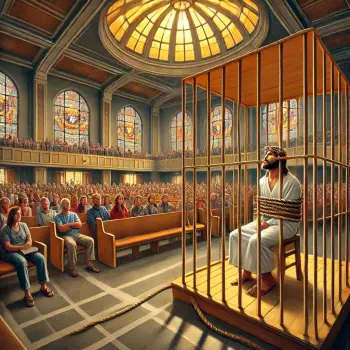When are all the speculations regarding ‘Eschatology’ going to ‘end’?
Sorry for the pun. But we have so much talk about the end of the world beginning to circulate again with the ‘prediction’ of 2011 by a well known radio preacher, as well as the secular interest in 2012 and the end of the Mayan calendar.
My first thought is to wonder when will the church begin to learn from its lessons in the past? Don’t we as Christians realize that hardly a generation has gone by in the last 2,000 years where various individuals or groups have attempted over to determine the date and time of Jesus’ return?
One only has to go to the New Testament itself to see that Paul was constantly battling false teachers in his congregations who espoused various speculations about the return of Jesus (see especially 1-2 Thessalonians).
All this despite the explicit teaching of Jesus that ‘no one knows’ (Matt 24:36; Mark 13:32) the time of His return (Now some have suggested that we may know the week or month of Jesus’ return, just not the ‘day’. However, the fact that Jesus used the terms ‘day’, ‘time’, and ‘hour’ interchangeably in Matt 24:42-51 suggests that He indeed meant that no one would know the time period at all).
Why then, one might ask, do we have in the New Testament so much teaching about the return of Jesus and ‘signs of the times’? And what are the key features of the New Testament’s teaching on the ‘end-times’? Space will only allow me to make a few brief observations.
First, I think that most of the current dialogue about ‘eschatology’ (or the ‘end-times’) in our churches fails to understand the nature of eschatology in light of the New Testament. For many Christians today, eschatology is a wholly future prospect.
In the New Testament, however, eschatology is present and future. It was present in that Jesus’ life, death, and resurrection, as well as the coming of the Spirit at Pentecost, were eschatological events. I will write more in subsequent articles on this point.
Let me just note for now that in the account of the descent of the Spirit at Pentecost (Acts 2), Peter explains to the people that the events that have transpired are the fulfillments of prophecy. Peter then quotes an eschatological passage from Joel, which notes, ‘and it will be in the last days . . . . (Joel 2:28-32; cf Acts 2:17-21). Peter exclaims that the present events that have been manifested amongst those gathered in the Name of Christ are a fulfillment of this eschatological passage!
Secondly, the present aspect of eschatology in the NT is also affirmed in that one of the key elements of the book of Revelation is the truth that the Lion of the tribe of Judah has ‘overcome’ (Rev 5:5). That is, Jesus has already won!
And now we are to live in the aftermath of His victory as ‘kings and priests’ (Rev 1:6)! Now I am not denying or even addressing the issue of whether the book of Revelation addresses the future. What I am suggesting is that NT eschatology absolutely deals with the present.
And as kings and priests we have a job to do! Fundamentally, this job is to proclaim that Jesus is Lord to a world that has its own kings and lords.
This brings us to our final consideration of the present aspect of NT eschatology. Namely, Jesus’ explicit warnings to His disciples that the time between the first coming of Christ and His return, in which they live as kings and priests, will be plagued by difficulty and hardship.
This warning is very apparent when we read Jesus’ eschatological sermon in Mark 13 (or Matt 24, or Luke 21) and note the commands/imperatives. They include: ‘watch that no on leads you astray’ (13:5: all translations here are my own); ‘do not be afraid’ (13:7); ‘watch for yourselves’ (13:9); ‘do not be anxious’ (13:11); ‘but pray’ (13:18); ‘do not believe it’ (13:21); ‘watch’ (13:23).
Mark 13 then closes with a series of commands/imperatives: ‘watch, stay awake’ (13:33); ‘therefore, be on the alert’ (13:35); and ‘be on the alert’ (13:37). This shows that Jesus understood well the adversity that His followers would face and the necessity for them to be prepared to face these challenges.
Paul, in fact, affirms that ‘through many tribulations we must enter into the kingdom of God’ (Acts 14:22).
Now it is not wrong for us to anticipate the return of Jesus. But if we spend so much effort looking for the signs of the times and failing to live faithfully today, then our efforts are misdirected. As Christians, we are to work today for His Kingdom knowing that ‘tomorrow will care for itself. Each day has enough trouble of its own’ (Matt 6:34: NAS).
So, are we spending our time becoming disciples of Christ who are prepared to face the tribulations inherent in living as kings and priests for His kingdom? Or, are we overly enamored with speculations about ‘the end’?

















